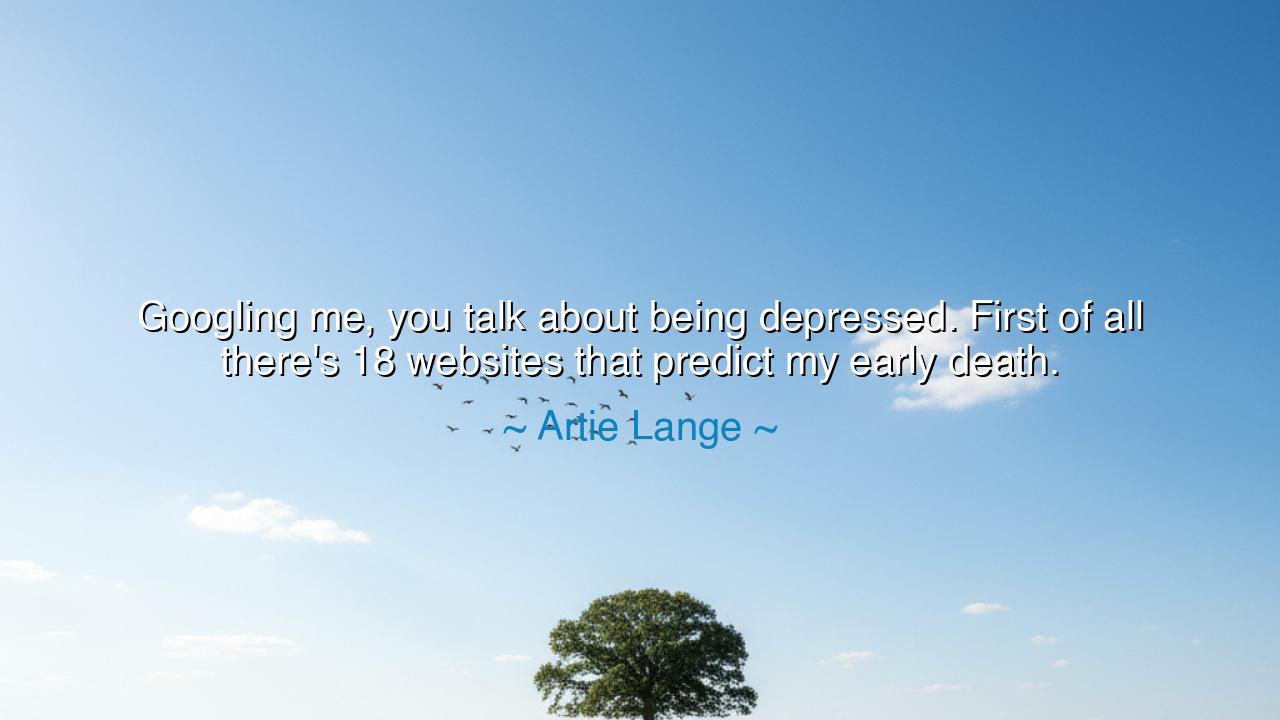
Googling me, you talk about being depressed. First of all there's
Googling me, you talk about being depressed. First of all there's 18 websites that predict my early death.






In the words of Artie Lange, “Googling me, you talk about being depressed. First of all there’s 18 websites that predict my early death.” we hear a voice that trembles between sorrow and laughter, between mockery and revelation. These words are more than jest; they are the cry of a man who has walked through the valley of despair and still finds the strength to jest with the shadows. Beneath the humor lies a truth as old as humanity itself—that those who suffer most often learn to wear a mask of laughter, not to deceive the world, but to survive it. In the heart of this quote beats the paradox of existence: the power to laugh in the face of darkness.
The meaning of Lange’s words is woven in irony. He speaks of depression, yet delivers his lament as comedy. The ancients knew this art well—the way the fool becomes the philosopher, the way tragedy and laughter spring from the same well. To “Google” oneself and find prophecies of doom is a modern reflection of an ancient torment: to see one’s own life mirrored through the eyes of others, often cruelly distorted. Lange’s statement mocks both the world’s obsession with spectacle and his own notoriety. Yet, within that jest, there lies a wound—the knowledge that fame magnifies pain, that the gaze of the crowd can wound more deeply than solitude ever could.
This duality calls to mind the ancient figure of Diogenes the Cynic, who lived in poverty and mocked the pretense of the powerful. He too was laughed at, scorned, and misjudged by the masses. Yet, Diogenes turned ridicule into wisdom, exposing the vanity of those who judged others while knowing nothing of truth. So too, Artie Lange, in his raw humor, exposes the sickness of a world that delights in predicting downfall. His jest, like Diogenes’ defiance, transforms humiliation into teaching. He reminds us that even in disgrace, the human spirit can speak with wit, strength, and truth.
There is a painful beauty in the humor of the broken. Those who have wrestled with despair often discover that laughter is not an escape from suffering, but a rebellion against it. To joke about one’s own death, as Lange does, is not to invite it—it is to rob it of its power. It is the same spirit that lived in Socrates, who, before drinking the poison of execution, joked about owing a rooster to Asclepius, the god of healing. Even in the moment of death, he refused to let fear dictate his tone. Laughter, when born from pain, becomes the final form of courage.
Yet this quote also serves as a mirror for society. We live in an age where the internet becomes the oracle, and reputations are shaped not by truth but by whispers. When Artie Lange says there are “18 websites that predict my early death,” he reveals the cruelty of a culture that feeds upon the suffering of others. Once, the ancient crowds gathered in coliseums to watch men battle beasts; now, they gather on screens to watch souls unravel. The quote warns us of this quiet savagery—the temptation to turn another’s pain into spectacle. It calls for compassion in a digital age, where every name carries a story unseen beneath the headlines.
The lesson here is both intimate and universal. If you find yourself mocked, misunderstood, or condemned by the unseen multitude, remember: the gaze of the world is fickle, but the strength of the heart is eternal. Do not let the prophecies of others define your worth. Live with defiance, laugh with courage, and forgive those who cannot see your light. For as Lange teaches through irony, the best way to silence the voices of doom is not to hide from them, but to live so fiercely that their predictions turn to dust.
So, to those who listen, take this wisdom to heart: The world will often try to write your ending before your story is complete. Let them write. You, meanwhile, must keep living, keep laughing, keep rising. Laughter born of pain is not weakness—it is the music of survival, the song of those who refuse to be broken. And when the world expects your fall, answer not with despair, but with humor, resilience, and life. For in that defiant laughter lies the immortal truth: that the human spirit, once awakened, can outlive every prediction of its demise.






AAdministratorAdministrator
Welcome, honored guests. Please leave a comment, we will respond soon